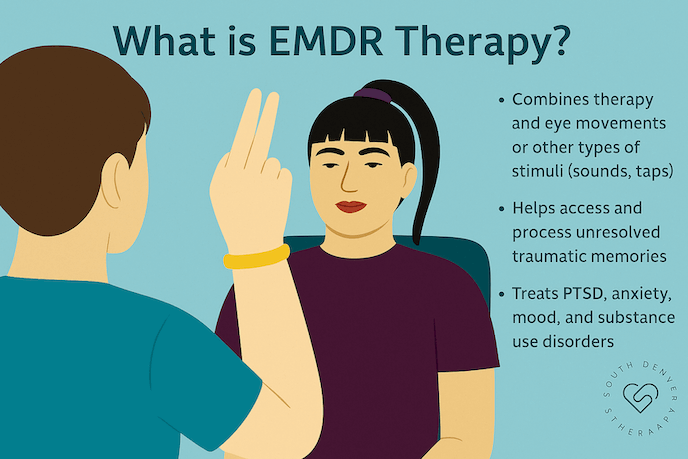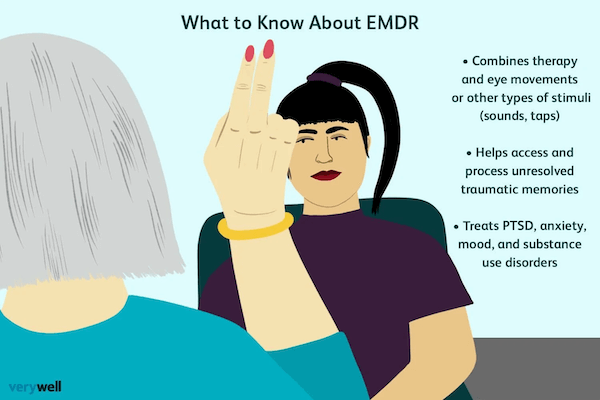
EMDR Therapy Near Castle Pines
Find healing from trauma, anxiety, and distress
What Is EMDR Therapy?
EMDR (Eye Movement Desensitization and Reprocessing) therapy is a specialized form of psychotherapy designed to help people heal from the lingering effects of traumatic events and distressing memories. Recognized as a leading treatment for post traumatic stress disorder (PTSD), anxiety disorders, and a range of other mental health conditions, EMDR therapy involves using guided eye movements or other forms of bilateral stimulation to help the brain process traumatic memories in a healthier way.
Unlike traditional talk therapy, EMDR doesn’t require you to relive every detail of a traumatic experience. Instead, the therapy gently activates your brain’s natural healing processes, allowing you to reprocess and release the emotional pain tied to past events. This approach is especially effective for those struggling with post traumatic stress, anxiety, or other mental health challenges related to traumatic experiences.
EMDR therapy is grounded in the principle that the mind can heal from psychological trauma much like the body recovers from physical wounds. By using movement desensitization and reprocessing techniques—such as following the therapist’s fingers with your eyes or experiencing gentle tapping—EMDR helps you overcome life’s toughest challenges and move forward with greater emotional stability and resilience.
Introduction to EMDR and How It Works
At its core, EMDR therapy is based on the understanding that our brains have a natural ability to process and heal from trauma, but sometimes this process gets “stuck” after a distressing event. EMDR helps to “unstick” these memories by guiding you through an eight-phase process that supports healing at every step.
During EMDR sessions, you’ll be asked to focus on specific traumatic memories or experiences while simultaneously engaging in bilateral stimulation—such as following side-to-side eye movements or feeling gentle taps. This combination helps your brain safely process and integrate traumatic experiences, reducing the emotional intensity and allowing you to develop healthier, more adaptive coping strategies.
The eight-phase structure of EMDR ensures that you are well-prepared, supported, and empowered throughout your therapeutic journey. Each phase is designed to help you reprocess traumatic memories, lessen their impact, and build the skills you need to move forward with confidence and emotional health.
How Effective Is Eye Movement Desensitization (EMDR) Therapy
For trauma survivors, EMDR therapy is widely recognized as one of the most effective treatments available. It is a proven effective and successful treatment for trauma and PTSD, and is recognized as one of the leading evidence based therapeutic modalities. It has decades of research behind it, showing that EMDR can help people process painful memories and significantly reduce emotional distress. Multiple studies have demonstrated EMDR’s success with post-traumatic stress disorder (PTSD) and other trauma-related conditions. In fact, major health organizations like the World Health Organization and the U.S. Department of Veterans Affairs have officially recognized EMDR as a best-practice approach for treating trauma. EMDR is used by healthcare professionals and healthcare providers worldwide to treat trauma and PTSD, and is effective in treating symptoms associated with these conditions. Beyond PTSD, EMDR has also been used successfully to address anxiety, depression, grief, and panic attacks. Approximately 70% of people encounter trauma at some point in their lives, making effective treatments like EMDR essential for recovery.
A key to EMDR’s effectiveness is the use of bilateral stimulation – often gentle back-and-forth eye movements or tapping. This process is a central part of the therapeutic process, activating your brain’s natural healing mechanisms and allowing disturbing memories to be reprocessed in a way that drains away their intense emotional charge. Over time, traumatic memories start to feel more distant and less overwhelming. You won’t erase what happened, but it will no longer provoke the same fear or pain, and you can begin to feel more in control of your thoughts and emotions.
At South Denver Therapy, we’ve seen firsthand how EMDR helps clients move forward when they’ve felt stuck for years. Many people experience breakthroughs with EMDR that they hadn’t achieved with other therapies. For a lot of our clients, it’s not just effective — it’s truly life-changing. Our approach is rooted in trauma-informed care and trauma informed approaches, which emphasize safety, trustworthiness, peer support, and collaboration to create a supportive healing environment. Our team includes trauma therapists, and at least one is a licensed professional counselor, ensuring clients receive expert, specialized care.
The EMDR Process
The EMDR process is a carefully structured and highly individualized approach that draws on the therapist’s extensive training and expertise. EMDR therapy consists of eight distinct phases, each tailored to address your unique needs and ensure a safe, effective, and comprehensive healing experience.
This evidence-based therapeutic modality is designed to help you fully process traumatic memories, reduce distressing symptoms, and restore emotional balance. By following the eight phases, your therapist can guide you through a step-by-step journey that supports your mental health and overall well-being.
Phases of EMDR and What to Expect
EMDR therapy unfolds in eight phases, each with a specific focus to ensure your healing journey is both safe and effective:
History-taking: Your therapist will gather a thorough understanding of your background, including any traumatic experiences and current mental health conditions. This helps identify the memories and issues that will be the focus of your EMDR work.
Preparation: You’ll learn about the EMDR process and develop coping skills to manage any distress that may arise. This phase is all about building trust, safety, and emotional stability before moving forward.
Assessment: Together, you and your therapist will pinpoint the most distressing traumatic memories or experiences to target during EMDR sessions.
Desensitization: Using bilateral stimulation—such as eye movements or tapping—your therapist will help you process and reduce the emotional charge of traumatic memories, making them feel less overwhelming.
Installation: This phase focuses on strengthening positive beliefs and adaptive thoughts, helping you replace negative beliefs that may have developed as a result of trauma.
Body scan: You’ll check in with your body to notice any lingering physical sensations or tension related to the traumatic experiences, allowing for further processing and release.
Closure: At the end of each session, your therapist will ensure you feel grounded and stable, providing coping skills and support as needed to maintain your emotional health between sessions.
Re-evaluation: In subsequent sessions, your therapist will review your progress, reassess your needs, and adjust the treatment plan to ensure you continue moving toward your goals.
This eight-phase approach is what makes EMDR such a powerful tool for treating trauma, PTSD, and other mental health conditions. By addressing both the emotional and physical sensations tied to traumatic experiences, EMDR helps you build effective coping skills, achieve greater emotional stability, and foster lasting resilience on your path to healing.
Hi, I’m Carissa! Let’s work together to heal, and transform through EMDR Therapy!
EMDR is a powerful, evidence-based method for addressing trauma and emotional distress. As a licensed therapist, I’m committed to guiding you through this transformative therapeutic process. Our practice uses trauma informed approaches and a holistic approach, integrating multiple modalities to address your unique needs. Together, we will work to resolve your past traumas—including complex trauma, emotional numbness, disturbing experiences, and traumatic memory—ease the burden of distressing emotions, and build healthier, effective coping strategies. Skills training is included as part of your treatment, helping you develop practical tools for resilience. Let’s embark on this journey of healing and recovery, so you can live a more balanced and fulfilling life.
How EMDR Therapy Can Help You
Trauma Healing
EMDR helps you process and release the emotional weight of traumatic events, including past trauma and the effects of experience trauma, allowing you to finally move forward with your life.
Symptom Relief
Many people see a reduction in symptoms associated with anxiety, depression, and PTSD. EMDR is proven effective in treating symptoms of trauma and PTSD, providing successful treatment outcomes for a wide range of trauma-related conditions. Overall mental health can improve as those burdens lighten.
Faster Progress
EMDR often leads to improvement more quickly than traditional talk therapy. It’s a valuable choice if you’re seeking an efficient path to feeling better.
Reprocessing Memories
This therapy guides you in safely revisiting distressing memories and “rewiring” how they’re stored. Gradually, those memories lose their grip and lead to genuine emotional healing.
Emotional Stability
EMDR equips you with tools and skills training to manage your emotions more effectively. You may find yourself less reactive to stress and better able to handle life’s challenges using effective coping strategies.
Greater Self-Insight
As you work through EMDR, you develop deeper self-awareness. Gaining insight into your reactions and beliefs fosters personal growth and a clearer understanding of yourself.

Why Choose Us For EMDR Therapy
Experienced & Skilled Team
Our therapists include licensed professional counselors and trauma therapists, bringing over 6 years of specialized experience in trauma therapy, so you receive the highest level of care from a team you can trust.
Compassionate, Non-Judgmental Care:
We provide a safe, welcoming space where you can share anything without fear of judgment. You will be met with understanding and empathy at every step.
Cultural Sensitivity
We recognize that everyone’s background and experiences are unique. Our team is committed to being culturally sensitive and respectful, honoring your individuality.
Free Consultation
We offer a free 15-minute consultation to talk about your needs and expectations. This gives you a chance to ask questions and ensure we’re the right fit before you begin therapy.
Confidentiality & Privacy
Your privacy is extremely important to us. We maintain strict confidentiality, so all of your personal information and discussions remain secure. You can feel safe knowing what you share stays between us.
LGBTQ-Friendly
Our practice is a haven for everyone, regardless of sexual orientation or gender identity. We pride ourselves on being an inclusive, LGBTQ+-friendly space that welcomes you with open arms.
What Our Clients Say
Your Local EMDR Trauma Therapists in Castle Pines
Looking for an EMDR therapist in Castle Pines? You’ve found the right place. At South Denver Therapy, our counseling center is located in Castle Rock, CO, serving the Castle Pines community and surrounding areas. Our team includes licensed professional counselors and trauma therapists dedicated to your well-being. Our space is warm, private, and designed to help you feel secure as you work through trauma, anxiety, or other emotional challenges.
We welcome new clients from Castle Pines and nearby communities. We understand how important it is for therapy to be accessible and tailored to you. That’s why every EMDR session is customized to support your unique healing journey — at a pace that feels comfortable for you. Both individual therapy and group therapy options are available as part of your treatment plan, depending on your needs. Our practice uses a holistic approach and evidence based therapeutic modalities to promote comprehensive healing. EMDR therapy can be conducted in multiple sessions, typically ranging from 6 to 12 sessions for effective results.
Whether you’re just beginning your journey or picking up where you left off, our compassionate therapists are here to walk alongside you every step of the way.
Convenient Location near Castle Pines
Our counseling center is located just off I-25 (near the Outlets at Castle Rock), only about a 10–15 minute drive south of Castle Pines. We welcome new clients from Castle Pines and other nearby communities. You can find us on Maleta Lane in Castle Rock, CO, conveniently located near Target and Castle Rock Adventist Hospital, just across from Philip S. Miller Park. Our team includes experienced healthcare professionals and collaborates with other healthcare providers to ensure comprehensive care.
South Denver Therapy
753 Maleta Lane, Suite 101F
Castle Rock, CO 80108

Frequently Asked Questions
-
Every person is different, so the number of EMDR sessions you might need can vary. During your initial consultation, our experienced therapists will assess your situation and develop a personalized treatment plan for you. This ensures we target your needs effectively right from the start.
-
We offer both in-person and online EMDR therapy sessions because we know flexibility is important. You can choose the option that best suits your lifestyle and comfort. Whether you prefer the convenience of virtual sessions or the face-to-face connection of an office visit, we’re here to accommodate you and provide the support you need.
-
We are an out-of-network provider and do not bill insurance directly. This allows us to offer personalized, client-centered care without restrictions from insurance companies, such as requiring a diagnosis or limiting session types. However, we’ve partnered with Mentaya, a service that helps you check your out-of-network benefits and may even file claims for you. You can use the tool on our website to see if you’re eligible for reimbursement.
Our rate is $175/hr for EMDR.



















